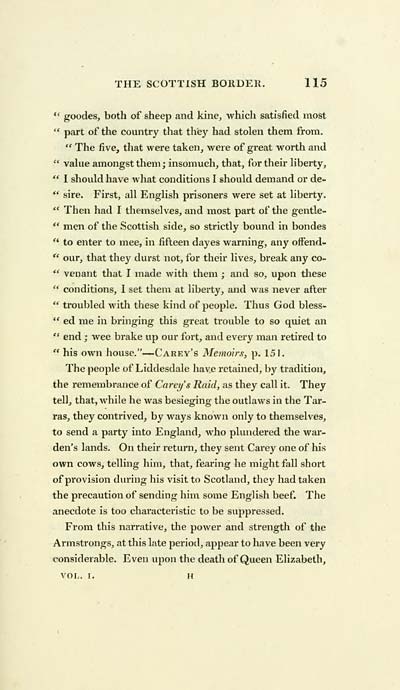Download files
Complete book:
Individual page:
Thumbnail gallery: Grid view | List view

THE SCOTTISH BORDER. 115
*' goodes, both of sheep and kine, which satisfied most
" part of the country that they had stolen them from.
" The five, that were taken, were of great worth and
" value amongst them ; insomuch, that, for their liberty,
" I should have what conditions I should demand or de-
*' sire. First, all English prisoners were set at liberty.
" Then had I themselves, and most part of the gentle-
" men of the Scottish side, so strictly bound in bondes
" to enter to mee, in fifteen dayes warning, any ofFend-
" our, that they durst not, for their lives, break any co-
" venant that I made with them ; and so, upon tliese
" conditions, 1 set them at liberty, and was never after
" troubled with these kind of people. Thus God bless-
" ed me in bringing this great trouble to so quiet an
" end ; wee brake up our fort, and every man retired to
" his own house." — Carey's Memoirs, p. 151.
The people of Liddesdale have retained, by tradition,
the remembrance of Carey's Raid, as they call it. They
tel], that, while he was besieging the outlaws in the Tar-
ras, they contrived, by ways known only to themselves,
to send a party into England, who plundered the war-
den's lands. On their return, they sent Carey one of his
own cows, telling him, that, fearing he might fall short
of provision during his visit to Scotland, tliey had taken
the precaution of sending him some English beef. The
anecdote is too chai-acteristic to be suppressed.
From this narrative, the power and strength of the
Armstrongs, at this late period, appear to have been very
considerable. Even upon the death of Queen Elizabeth,
VOL. I. H
*' goodes, both of sheep and kine, which satisfied most
" part of the country that they had stolen them from.
" The five, that were taken, were of great worth and
" value amongst them ; insomuch, that, for their liberty,
" I should have what conditions I should demand or de-
*' sire. First, all English prisoners were set at liberty.
" Then had I themselves, and most part of the gentle-
" men of the Scottish side, so strictly bound in bondes
" to enter to mee, in fifteen dayes warning, any ofFend-
" our, that they durst not, for their lives, break any co-
" venant that I made with them ; and so, upon tliese
" conditions, 1 set them at liberty, and was never after
" troubled with these kind of people. Thus God bless-
" ed me in bringing this great trouble to so quiet an
" end ; wee brake up our fort, and every man retired to
" his own house." — Carey's Memoirs, p. 151.
The people of Liddesdale have retained, by tradition,
the remembrance of Carey's Raid, as they call it. They
tel], that, while he was besieging the outlaws in the Tar-
ras, they contrived, by ways known only to themselves,
to send a party into England, who plundered the war-
den's lands. On their return, they sent Carey one of his
own cows, telling him, that, fearing he might fall short
of provision during his visit to Scotland, tliey had taken
the precaution of sending him some English beef. The
anecdote is too chai-acteristic to be suppressed.
From this narrative, the power and strength of the
Armstrongs, at this late period, appear to have been very
considerable. Even upon the death of Queen Elizabeth,
VOL. I. H
Set display mode to: Large image | Transcription
Images and transcriptions on this page, including medium image downloads, may be used under the Creative Commons Attribution 4.0 International Licence unless otherwise stated. ![]()
| Early Gaelic Book Collections > J. F. Campbell Collection > Minstrelsy of the Scottish border > Volume 1 > (317) |
|---|
| Permanent URL | https://digital.nls.uk/80612130 |
|---|
| Description | Vol. I . |
|---|---|
| Shelfmark | Cam.2.d.17 |
| Additional NLS resources: | |
| Attribution and copyright: |
|
| Description | Volumes from a collection of 610 books rich in Highland folklore, Ossianic literature and other Celtic subjects. Many of the books annotated by John Francis Campbell of Islay, who assembled the collection. |
|---|
| Description | Selected items from five 'Special and Named Printed Collections'. Includes books in Gaelic and other Celtic languages, works about the Gaels, their languages, literature, culture and history. |
|---|

